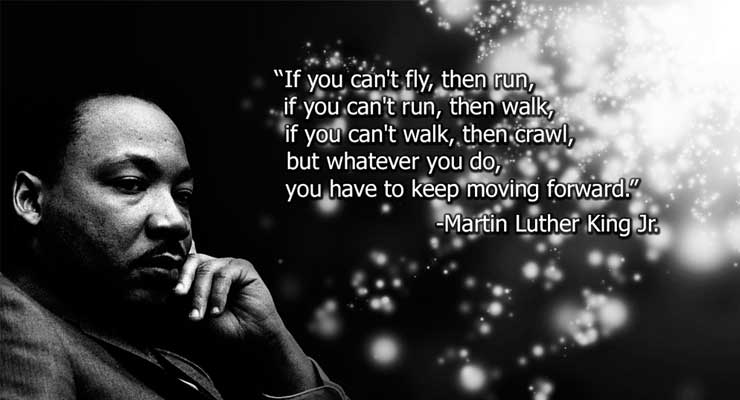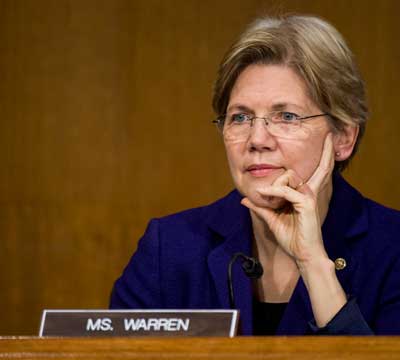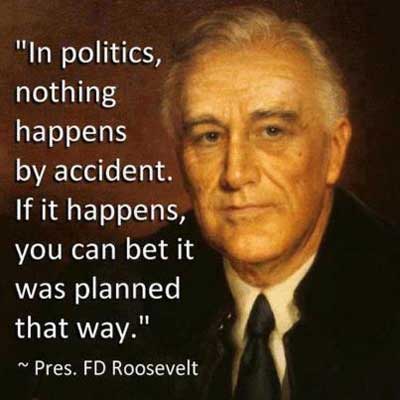
The fifth in a series of seven posts on Electoral Strategy.
The inside/outside strategy depends on our own capacity to view other wings of the movement — positions we may not initially agree with — as leverage.
The mainstream machine Democrats need to know we are considering supporting the dissident Democrats, unless.… The dissident Democrats need to know we are considering the third party, unless.… The third party needs to know that we are considering giving our time to social movement organizing, unless….
There is no threat of exit without somewhere to exit to.
It is, after all, what we do that matters, not what the politicians or candidates do. Consider adopting the strategic sense of Martin Luther King.
In addition to the development of genuinely independent and representative political leaders, we shall have to master the art of political alliances. Negroes should be natural allies of many white reform and independent political groups, yet they are commonly organized by old-line machine politicians. We will have to learn to refuse crumbs from the big-city machines and steadfastly demand a fair share of the loaf. When the machine politicians demur, we must be prepared to act in unity and throw our support to such independent parties or reform wings of the major parties as are prepared to take our demands seriously and fight for them vigorously. This is political freedom; this is political maturity expressing our aroused and determined new spirit to be treated as equals in all aspects of life. [1]
Take King’s stance toward powerful political leaders. Lyndon Johnson passed more social legislation than any other president since FDR, including historic civil rights and voting laws, yet King remained critical of LBJ. Johnson’s pursuit of the Vietnam War and his failure to enforce civil rights laws was cause enough for King to withdrawal his support for Johnson’s reelection. Before Johnson decided not to run, King was assisting Robert Kennedy and giving Eugene McCarthy serious consideration in his independent bid for president. His willingness to negotiate hard with the Democrats is unmatched by current labor and social movement leaders.
Now, concessions are too often viewed as reason for uncritical support. Horse trading has too often replaced political struggle. That, we are told, is the “give and take” of normal political life. The crisis demands that we turn toward a “new normal:” making demands, eliciting promises and proposing programs based on threat of exit. There is no threat of exit without somewhere to exit to.
Activists are already busy supporting the candidacies of Bernie Sanders. Why would the Clinton machine move without a threat to its power?
Pushing Warren and Sanders
Warren and Sanders are the best potential candidates the two-party system has produced and if we work well and hard perhaps one can win the presidency. Every candidate that positions themselves toward the people and the social movements rather than the center weakens triangulation. While Warren seems to have stood down, Sanders is surging with a counter-strategy — moving toward the social movements and taking voters with him.

By standing up to the worst abuses of the corporate power Sanders have pushed the focus toward the concerns of everyday people and his popularity is a threat Clinton must try to contain. Whatever the limits of Sander’s politics — there is a real educational value to his positions — adding content to the content-free elections triangulation tends to produce.
Even beyond reasoned debate, vigorous dissent can convert weakness to strength. Since triangulation has accustomed the somewhat de-politicized center to select candidates based on style, image and the appearance of integrity, some will move left by virtue of strong, courageous and ethical leadership, regardless of the issues. Sanders is winning some of those voters already.
If pressed with enough skill and resources Sanders will force even a master triangulator like Clinton to lose support or make a gesture toward the people. In fact, Warren and Sanders have already forced incumbents, Obama, Clinton, Democrats and Republicans, to pay lip service to income inequality and political reform.
Its going to be really hard for labor unions to reject the routine advise of its political consultants to “always back a winner.” Yes, your organization may benefit from small concessions but we need to consider the long-term trade-off. We get small short-term concessions as the status quo becomes ever more entrenched.
After all, triangulation is a modern version of the classic ruling class strategy: divide and conquer. They rule not simply through force but by selective concessions that demobilize the opposition by giving us just enough to keep us in line.
Activists engaged in the good work of promoting Warren and Sanders must confront the claim of that dissident candidates are “unelectable” in the general election. Again, we have Obama to thank for putting that one to rest. If a black man with an islamic sounding name, proposing what seemed like real change, can be elected President of the US then all bets are off.
The American people are ready for serious change.
Obama’s 2008 campaign is suggestive. He worked with regular Democrats when possible and built a parallel and independent organization when he was rejected by the machine. In 2008 Clinton was also the presumed candidate. Obama retained enough organizing wisdom from his youth and successfully tapped the longing for change.
Once elected, Obama returned to the fold and to triangulation, but we need to learn from every opportunity and be forewarned.
It’s what we do that matters.
Sanders supporters should look to the third parties, social movements and welcome — yes welcome — the debate. Since turnout is essential in overcoming triangulation and reversing the rightward trend, Warren and Sanders would become better able to motivate the disaffected, non voter, and independent by engaging with, learning from, and leaning toward Greens, Ferguson, #BlackLivesMatter, Occupy, the peace movement and the progressive labor unions.
 And if you think such a move is completely out of the question in American politics take a close look at the rhetoric, policies and history of Franklin D. Roosevelt. [2] He moved in the direction of popular resistance. While FDR’s politics were far from ideal and the corporate state had not achieved its current supremacy, the strategic moves FDR made are still instructive. Mainstream political actors can realigned voter behavior and allegiances if faced with crisis and/or significant outside political pressure.
And if you think such a move is completely out of the question in American politics take a close look at the rhetoric, policies and history of Franklin D. Roosevelt. [2] He moved in the direction of popular resistance. While FDR’s politics were far from ideal and the corporate state had not achieved its current supremacy, the strategic moves FDR made are still instructive. Mainstream political actors can realigned voter behavior and allegiances if faced with crisis and/or significant outside political pressure.
Whatever the fate of the Sanders’ candidacy, his choices are actually not our primary concern. Many voters, new or occasional voters especially, will be drawn into the contest and will learn important things from Sanders. What are we going to do with them and their new level of awareness? That is our concern.
If Sanders wins the nomination, then simultaneous support for Sanders and the Green Party makes the most sense given the IOS. Support two candidates simultaneously? Outrageous! Hardly. The corporations have been doing this for a century because it makes good strategic sense to do so.
Support means more than votes, in fact votes are the least of it. There is nothing to stop us from giving our money and time to both. We need the Green Party to pose a healthy challenge, raise the level of discourse and point out the weaknesses of the two-party system that will become evident after Sanders is President.
Unless scores of new like-minded congress members are elected, as occurred during the 1930s, Sanders will be facing the same deeply entrenched corporate power that Obama made peace with. Changing that is the job of the social movements.
If Sanders does not win the nomination then activists should encourage Sanders supporters to pursue the change that they want. If Clinton wins the nomination and moves toward the extreme center, a likely outcome given her history, then movement activists have two productive choices: encourage former Sanders supporters to rush to the Green Party or stay with Clinton trying to move her toward the social movements.
Those who maintain a critical embrace of Clinton are doing valuable work but they should also accept that the dissenters and the Green Party are their best allies in that effort. We need every pole of opposition and every threat of exit. That’s the politics of the IOS.
Without the Greens and dissident social movements, Clinton activists will be left to play the weak hands of moral or ideological argument against a machine long attuned to seeing only power.
Warren and Sanders have succeeded so far through passionate and well-reasoned criticism and by offering bold solutions to important issues. Rising expectations fuel social change. Let’s learn that well no matter where we stand.
[1] MLK Where do we Go from Here 607, The essential Writings and Speeches of Martin Luther King, ed. James M. Washington. See also Black Power Defined, 309
[2] See an under-appreciated anthology, New Deal Thought ed. Howard Zinn. The authors show the breadth of alternatives floated during this period of popular upsurge, organizing, and alternative parties.
Leave a Reply